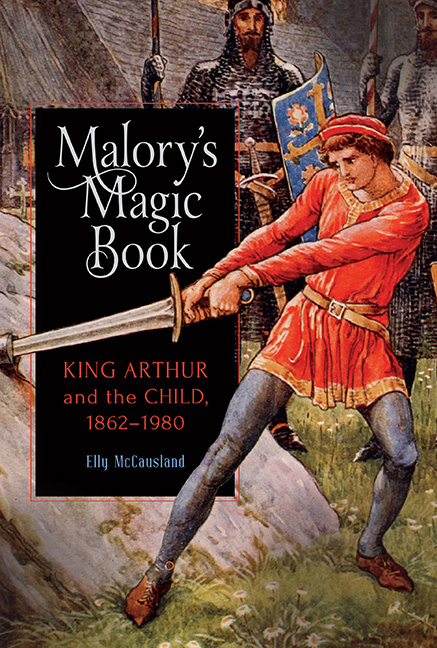Book contents
- Frontmatter
- Dedication
- Contents
- List of illustrations
- Acknowledgements
- A note on names
- Introduction
- 1 ‘Ever fresh and fascinating to the boy and girl of today’: the timeless child and the childish medieval in nineteenth-century Arthuriana
- 2 Risk and revenue: adventurous Arthurian masculinities in the work of Howard Pyle and Henry Gilbert
- 3 The ill-made adult and the mother's curse: psychoanalysing the Arthurian child in T. H. White's The Once and Future King
- 4 ‘Monty Python was not that far away’: the instability of 1950s Arthuriana for children
- 5 ‘For a little while a magician’: potent childish fantasies in John Steinbeck's Acts of King Arthur and his Noble Knights
- Conclusion: At the crossing-places
- Bibliography
- Index
- Arthurian Studies
4 - ‘Monty Python was not that far away’: the instability of 1950s Arthuriana for children
Published online by Cambridge University Press: 04 April 2019
- Frontmatter
- Dedication
- Contents
- List of illustrations
- Acknowledgements
- A note on names
- Introduction
- 1 ‘Ever fresh and fascinating to the boy and girl of today’: the timeless child and the childish medieval in nineteenth-century Arthuriana
- 2 Risk and revenue: adventurous Arthurian masculinities in the work of Howard Pyle and Henry Gilbert
- 3 The ill-made adult and the mother's curse: psychoanalysing the Arthurian child in T. H. White's The Once and Future King
- 4 ‘Monty Python was not that far away’: the instability of 1950s Arthuriana for children
- 5 ‘For a little while a magician’: potent childish fantasies in John Steinbeck's Acts of King Arthur and his Noble Knights
- Conclusion: At the crossing-places
- Bibliography
- Index
- Arthurian Studies
Summary
‘Mr White is a literary eccentric, as much at home in the mire and marvels of medieval Britain as anybody not a professional historian can ever have been’, read an article in the New Statesman in 1958. ‘Are we to count his Arthur, though, as the representative Arthur of our day?’ The answer appears to have been no. In 1953, the Oxford scholar, biographer and children's writer Roger Lancelyn Green commented that ‘the great legends’ – Arthur and Charlemagne, Beowulf and Sigurd – ‘are still waiting for their true interpreters’. The Arthurian stories have ‘been retold again and again for young readers, but never yet in a version which has endured or deserved to do so’. Although White's version does in fact endure as a popular text today, discussion of Arthurian adaptation during the 1940s and 1950s often ignored or downplayed his contribution. An article published in the American Elementary English Review in 1940, ‘The Arthurian Legends: Editions Suitable for School Use’, recommended a series of both British and American adaptations, including those by Howard Pyle and Alfred Pollard. White's version did not appear on the list, although the author, May Dalrymple, advised that familiarity with these other texts ‘will later increase [the reader's] enjoyment of […] stories in which there are allusions to the ancient tales, such as Mark Twain's A Connecticut Yankee in King Arthur's Court, or T. H. White's The Sword in the Stone’. Whether a result of its length, the difficulty of identifying its demographic, or the fact that, as Dalrymple suggests, it departs from and elaborates upon the Morte to the extent that it constitutes ‘allusion’ more than direct adaptation, we find evidence in the 1940s and 1950s that White's text had not provided a definitive Arthur for the modern age.
In 1946 Brian Kennedy Cooke, a representative of the British Council in Italy, published King Arthur of Britain, an adaptation of the Morte for children. In his introduction, Cooke delivered a damning appraisal of previous efforts from the end of the nineteenth century:
A lamentable fashion arose towards the end of the last century of producing insipid special versions for children, illustrated with two-dimensional dummies in pasteboard armour, which kindly but undiscerning aunts and uncles could pick up without efforts on the Christmas bookstalls.
- Type
- Chapter
- Information
- Malory's Magic BookKing Arthur and the Child, 1862–1980, pp. 115 - 142Publisher: Boydell & BrewerPrint publication year: 2019



